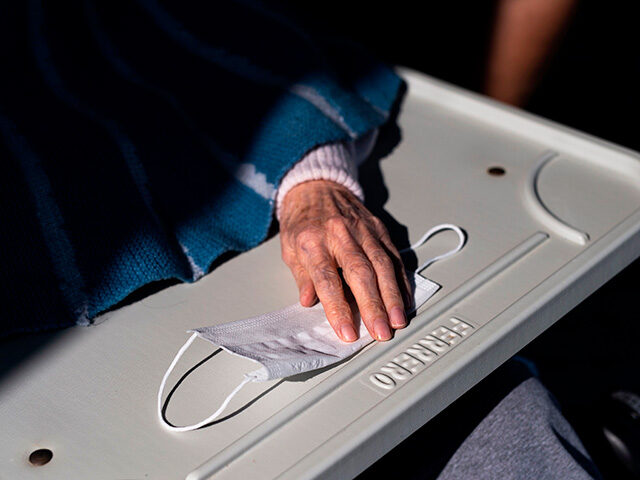The Health Ministry of British Columbia, Canada, announced this week the reinstatement of sanitary mask mandates in healthcare facilities and assisted-care facilities, reportedly in response to a rise in documented cases of respiratory disease.
Officials cited influenza, Wuhan coronavirus, and respiratory syncytial virus (RSV) infections as the most alarming and most rapidly spreading in the province. All three cause varying respiratory symptoms. In sensitive patients – such as young children, the elderly, and the immunocompromised – all three viruses are known to have the potential to cause pneumonia and other severe complications. Rarely, patients have died as a result of these complications.
The Northern Hemisphere as a whole, deep into the winter months, is currently facing an increase in a variety of infections that circulate among people more freely as they spend more time in close quarters in doors – particularly in places that attract large congregations, such as schools. Hospitals in several U.S. states have also started to either strongly recommend or mandate the use of sanitary masks in their facilities in response to the threat. In China, social media has flooded in the past week with alarming videos of overcrowded hospitals full of panicked patients.
Mask usage to prevent respiratory infections became prevalent in East Asia following the spread of SARS-CoV-1, commonly known as SARS, and spread around the world with the onset of the Wuhan coronavirus pandemic. In much of the West, governments imposed legal mandates forcing citizens to cover their faces in nearly all public areas. Some locations, such as Hong Kong, struggled to impose both mask mandates intended to prevent the spread of coronavirus and mask bans intended to suppress anti-communist dissent simultaneously.
Canada’s CBC News reported on Wednesday that the Health Ministry in British Columbia implemented a mask mandate on Monday for “everyone in health-care facilities, including staff, patients, visitors and volunteers.” The mandate applies “in areas where patients are actively seeking care.” Masks are reportedly not required in private rooms where only one patient is staying, or when people are actively eating or drinking.
“The ministry expects the requirement to remain in place until spring 2025,” the CBC relayed.
The Canadian Press reported on Thursday that British Columbia is experiencing one of Canada’s largest outbreaks of influenza infections. Influenza, it added, is spreading at a significantly higher rate than Wuhan coronavirus, which is seeing significantly lower spread in British Columbia than elsewhere.
The British Columbia Nurses Union (BCNU) reacted negatively to the news about the mask mandate – not because the union opposed the alleged benefits of wearing sanitary masks, but because the mandate, it argued, forced nurses into the uncomfortable position of being frontline enforcement of the policy.
“What we see is our members sometimes being put in a situation where they are having to remind visitors that they need to don a mask, and sometimes visitors become frustrated and then they take that out on nurses,” the president of the BCNU,Adriane Gear, told the Canadian outlet Global News.
“There hasn’t been any sort of thoughtful discussion in terms of how this will be managed, who will be responsible for enforcing the policies,” Gear lamented, “and at least that recognition that it could generate additional workload and risk for nurses that are already working incredibly hard in some really challenging conditions.”
During the Wuhan coronavirus pandemic, Canada under Prime Minister Justin Trudeau implemented onerous civil rights restrictions on citizens in the name of containing the virus – and Trudeau himself maligned opponents of the policies as “racist” and “misogynistic.” The heavy-handed civil rights restrictions birthed a massive protest movement, led largely by truckers, known as the “Freedom Convoy” that in 2022 began pressuring the government to drop some of its most intrusive mandates.
The mask mandates in healthcare contexts were reportedly dropped intermittently in April 2023 and brought back in full in October of that year. They have increasingly become common in Canada during the flu season.
Outside of Canada, residents of several American states are experiencing a return of mask mandates in health centers. Hospitals and other healthcare centers in Wisconsin, California, Illinois, Indiana, New Jersey and New York have independently required visitors and staff to wear masks again in the past month, though state governments have not intervened conclusively, letting medical experts take the initiative. Some health centers in California did not reinstate the mandates because they never ended, beginning during the early days of the coronavirus pandemic.
The World Health Organization (W.H.O.) declared the Wuhan coronavirus global public health emergency over in March 2023.
While that particular virus no longer poses a threat, the W.H.O. weighed in this week on reports of mounting cases of Human Metapneumovirus (HMPV) infection in China, alongside the usual surge in coronavirus, influenza, and RSV infections. Social media outlets in China have been flooded with videos of overcrowded hospitals and “mayhem” at health facilities, prompting fears of another novel disease.
“China’s reported levels of respiratory infections are within the usual range for the winter season,” the W.H.O. told the Chinese state media outlet Global Times this week. “Authorities report that hospital utilization is currently lower than this time last year, and there have been no emergency declarations or responses triggered.”
It added that HMPV is a known virus and no evidence exists at the moment of the spread of any novel or unknown pathogen.
Follow Frances Martel on Facebook and Twitter.

COMMENTS
Please let us know if you're having issues with commenting.